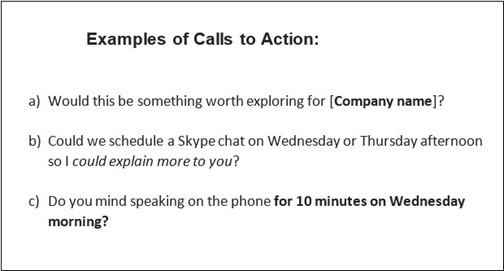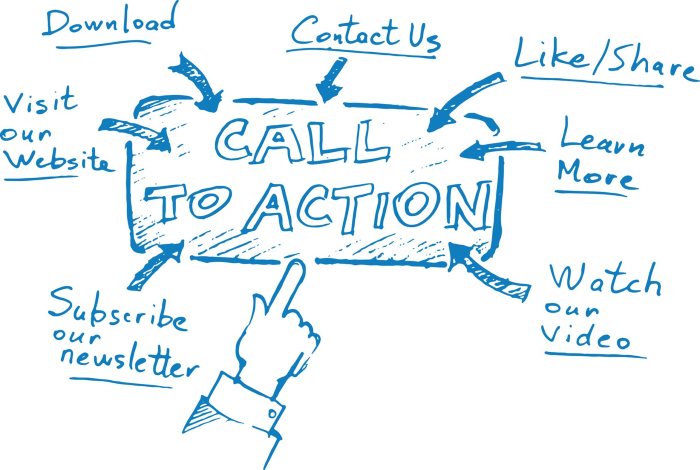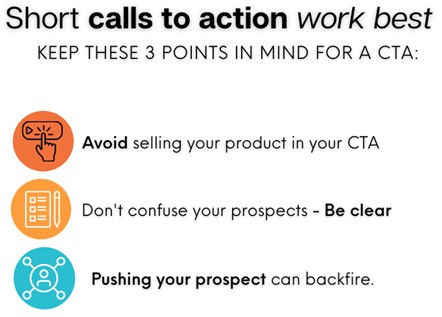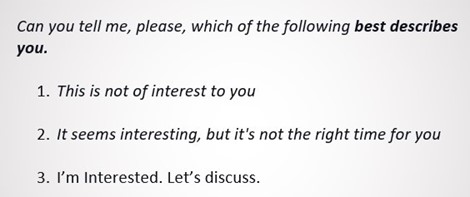A call to action (CTA) is what you would like your cold email recipient to do next.
Your email recipients need guidance. The value propositions in your email may be supported by a memorable brand story, compelling testimonials, and logical arguments, but without a CTA, those elements may prompt an "I understand, but what do I gain from this?" reaction from the reader.
Why CTAs Are Vital to Email Marketing
Email campaigns are ineffective without a CTA. The call to action specifies what the sender wants from the prospect to convert them over time.
You can find examples of cold email CTAs online, and a few will be discussed in this article.

As a marketer, you get to decide which call to action is most appropriate. You decide whether your prospects are up for a humorous CTA or whether they are serious and prefer a polite tone.
That's because to maximize sales, a killer cold email needs a unique approach. Think of it as a nudge in the right direction.
Why CTAs Are Important in Cold Emails
Cold emailing is simply reaching out via email to potential customers you don't yet have a relationship with, so you can increase sales, online visibility, and brand awareness.
A well-written and tailored CTA can increase clickthrough rates 30-35%.
But call to action keyphrases are even more powerful than that. Here are a few more benefits to including well-written CTAs in cold emails.
1. Good CTAs get conversions
When a CTA is well written, it provides a better user experience because it directs recipients to the next step you want them to take. The result is a higher response rate and increased sales leads.
2. Good CTAs increase sales
Cold sales prospects can be intrigued and check out your product when you include a compelling CTA.
You can trigger emotional responses in people by using scarcity, urgency, and curiosity to make them more intrigued about your product.
3. Good CTAs build relationships
Cold emailing your prospects certainly does not guarantee they will reply. The email might be deleted or ignored if it isn't convincing enough.

Source: Mirasee
Some prospects will be difficult to deal with, and you might have to negotiate with them or give them an exclusive offer to close the deal.
By including a compelling CTA in your cold email, you're more likely to get your recipient to reply, start a conversation, and go on to build a lasting relationship.
Things to Consider When Writing a CTA
A great CTA must be written with purpose. A cold email campaign that doesn't ensure prospects click on your call to action will have failed.
Consider the following factors when drafting a CTA.
1. What motivated me to compose this email?
- Why have you reached out to these recipients?
- How do you want to meet them? Would you rather chat via phone or Skype?
- Do you want them to give you feedback, share your material online, etc.?
- Do you want them to click a link in your email and access your website or landing page?
- Do you want prospects to sign up for a free trial?

2. How well does my prospect understand what I want from them?
You must be as precise as possible. Avoid vague phrases such as "Let's meet next week," because prospects will be confused.
Let them know whether you have a specific day in mind for a meeting, and a specific means of communication. Prospects will let you know if they can't meet on the requested day.
Prospects are more likely to agree to move forward when they clearly understand what they're getting into.
Examples of Cold Email CTAs
A successful cold email campaign relies on the number of recipients who take the desired action, and so that should be the No. 1 goal of your email CTA.
Here are a few popular types of email calls to action.
1. CTAs With a Specific Time and Date
Let's say your goal in your sales outreach is to set up a meeting or a phone call to discuss more about your product or service.
The first step is to craft a cold email that helps your prospects explain your value proposition.
If you have successfully reached a prospect willing to speak with you, it would be beneficial to specify a date, time, and duration of the meeting to eliminate friction and set the stage for the rest of the conversation.
Which of the following would you be more likely to respond to?

Because the second option reduces cognitive overload for prospects, they are more likely to respond to it. By providing a specific time and date, it reduces the mental processing needed to reply to the email. The prospect does not have to plan the amount of time to budget, what date and time can work for both of you, etc.
2. Multiple-Choice CTAs
In this scenario, despite sending three to four emails to your prospects you have not heard back. Try a CTA similar to this:

A call to action like that significantly reduces friction and effort for your prospects.
After following up several times, receiving any response is better than not hearing back. You make it easier for prospects to respond by providing three simple options. All they need to do is select a number and click reply.
The prospect will find the process less onerous.
* * *
Because you know your prospects better than anyone, you can best decide what works and what doesn't.
Your knowledge of your audience will help you craft a compelling cold email CTA that will increase your conversion rates, boost your online credibility, and help you build stronger customer relationships.
More Resources on B2B Cold Emailing
How to Create Response-Boosting Cold Emails




